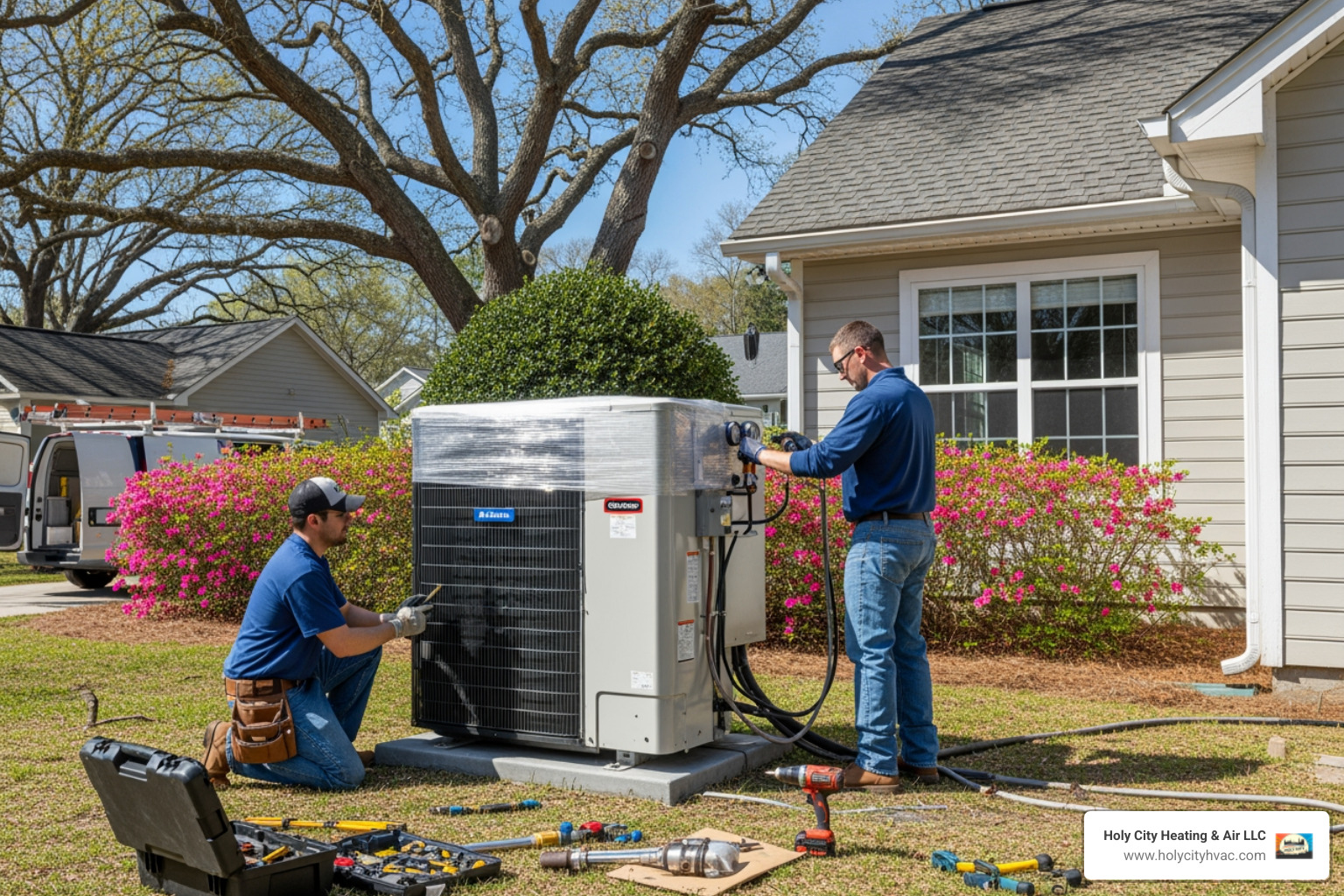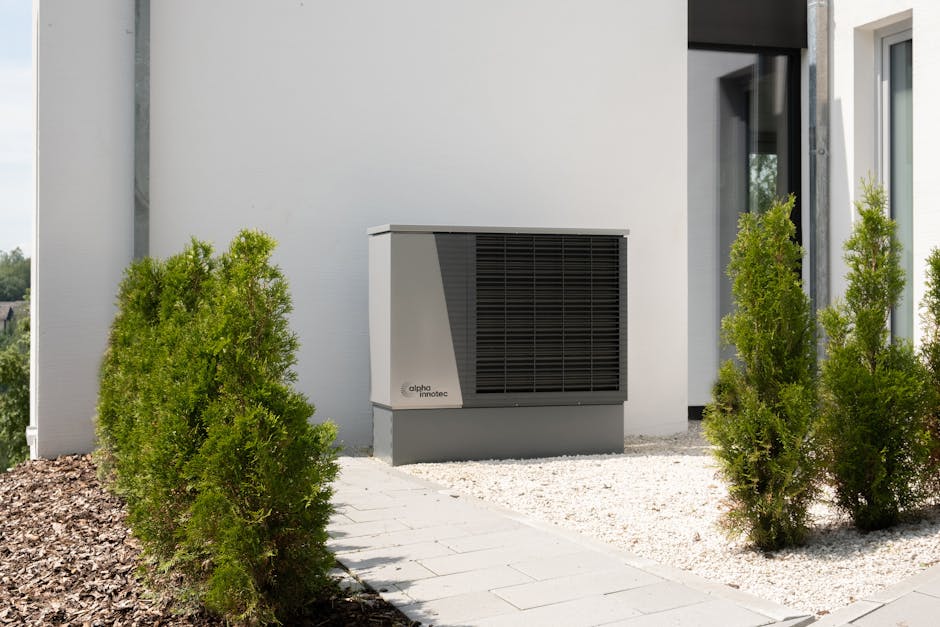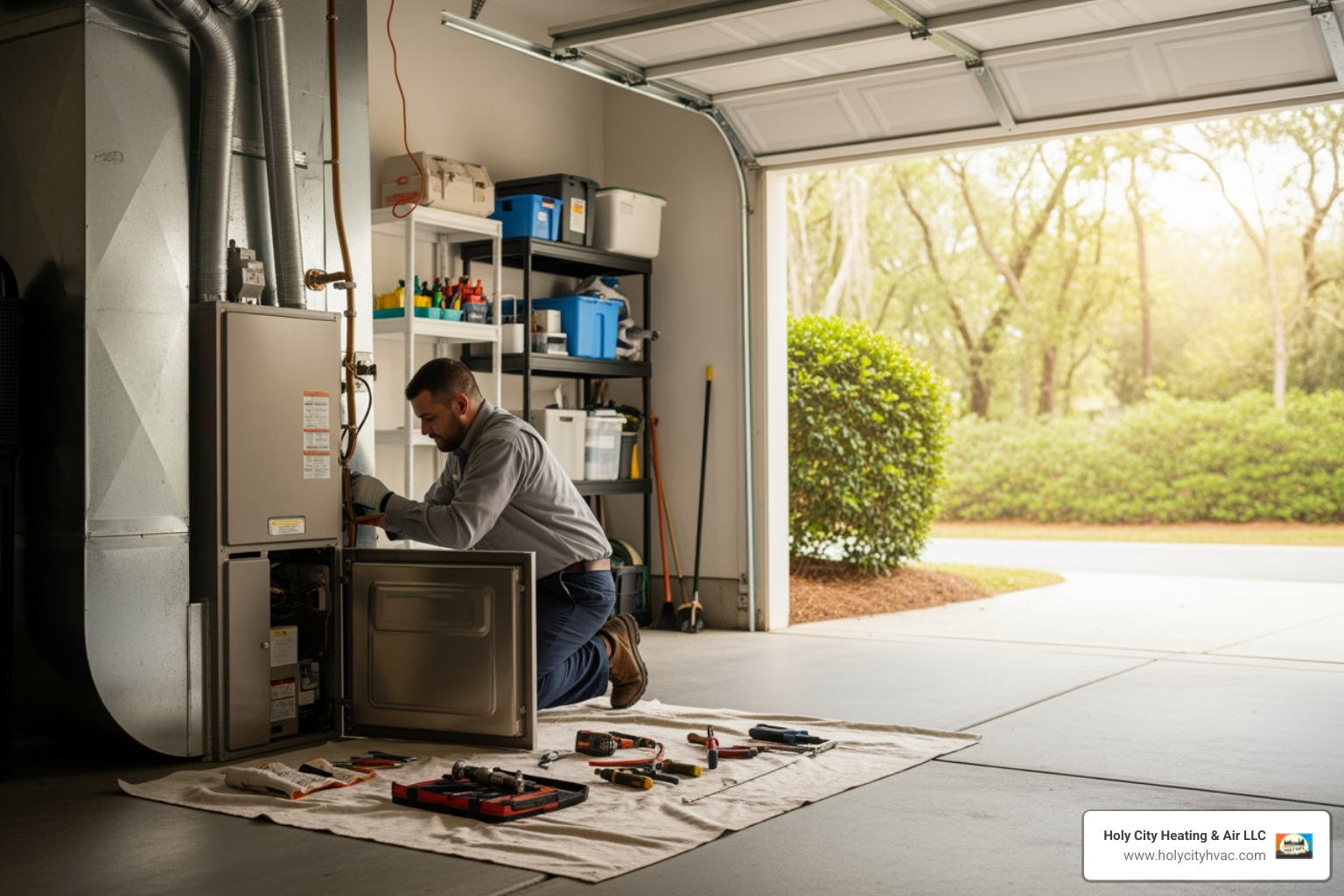
When Cold Showers Strike: Understanding Your Repair Options
Gas hot water system repairs can range from simple DIY fixes to complex professional jobs, but knowing what you're dealing with makes all the difference. Here are your main repair options:
Common DIY Repairs:
- Relighting a pilot light
- Adjusting thermostat settings
- Flushing sediment buildup
- Tightening loose drain valves
Professional Repairs Needed:
- Gas valve replacement
- Thermocouple replacement
- Internal tank leaks
- Gas line issues
Nothing ruins your morning quite like stepping into an ice-cold shower when you're expecting hot water. If you're a Charleston homeowner dealing with a finicky gas water heater, you're not alone - these systems typically last 10-15 years but can develop issues along the way.
The good news? Many gas hot water system problems have straightforward solutions you can handle yourself. Others require professional expertise for safety reasons. Understanding the difference can save you time, money, and frustration.
Before we dive into specific repairs, safety always comes first when working with gas appliances. If you smell gas or feel unsure about any repair, stop immediately and call a licensed professional.
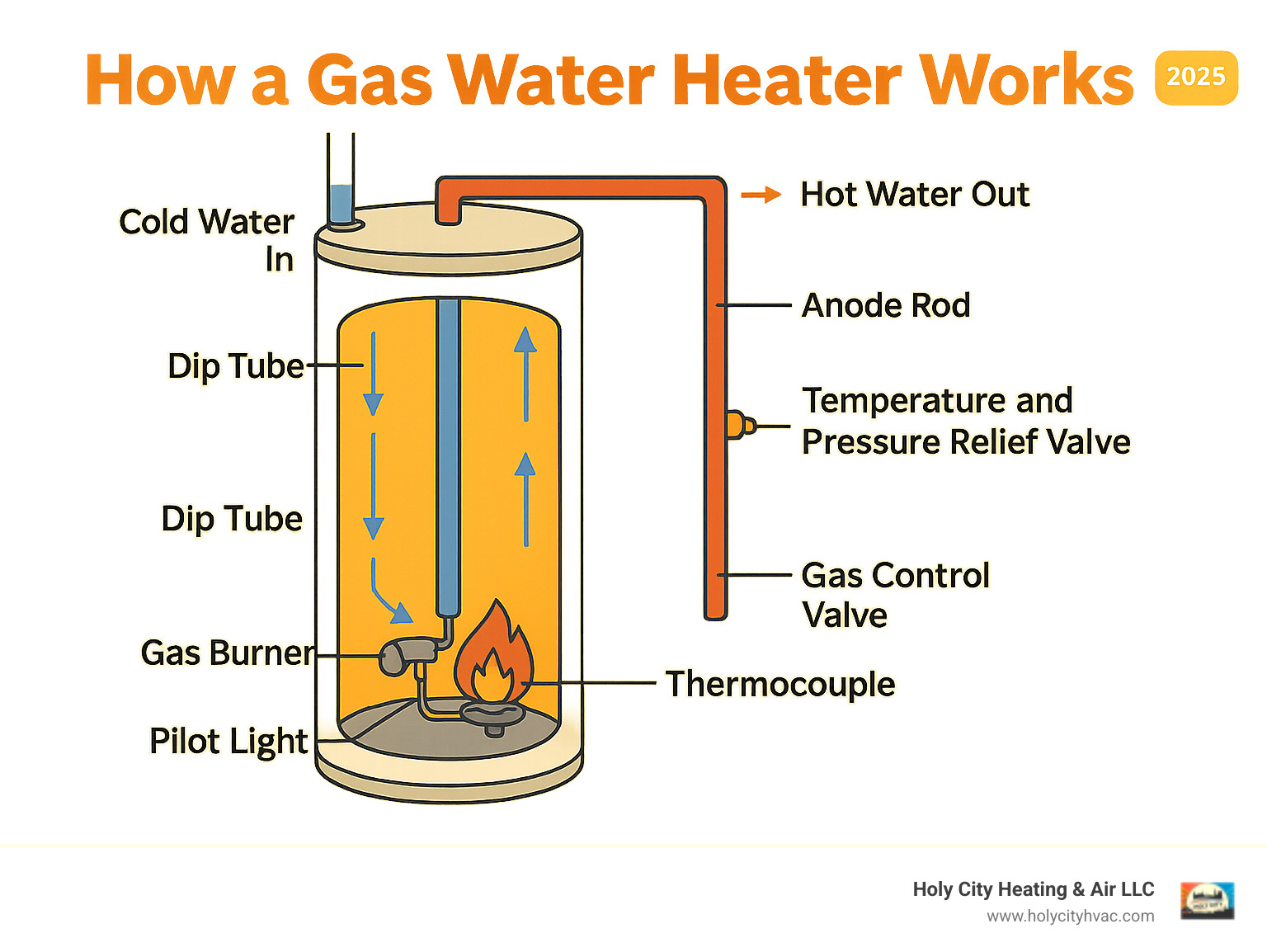
Safety First: Essential Precautions Before You Begin
Before you roll up your sleeves for any gas hot water system repairs, let's talk safety. Working with gas appliances isn't like fixing a leaky faucet – one mistake can put your entire household at risk.
The biggest danger sign is the unmistakable rotten egg smell. Gas companies add a chemical called mercaptan to natural gas to give it this odor so you'll notice leaks immediately. If you smell gas or hear hissing sounds near your water heater, don't ignore it.
Here's what to do if you smell gas: Don't touch any electrical switches or appliances. Don't use your phone inside the house. Get everyone out immediately and call your gas company and 911 from outside. What To Do If You Smell Natural Gas provides detailed emergency steps.
Assuming you don't smell gas, you must shut off your gas supply before starting work. Find the gas shut-off valve on the line leading to your water heater and turn the lever so it's perpendicular to the pipe.
You'll also want to shut off the water supply by turning the cold water inlet valve at the top of your heater clockwise until it's closed.
Proper ventilation is crucial because gas water heaters produce carbon monoxide. Ensure your work area has good airflow and that the vent pipe isn't blocked. Working carbon monoxide detectors in your home are essential.
Finally, grab protective gear – safety glasses and work gloves will protect you from sharp edges and splashes. For more detailed safety information, check out our guide on safe gas piping tips.
Understanding Your System's Components
Your gas water heater has several key components. Understanding their roles helps in troubleshooting.
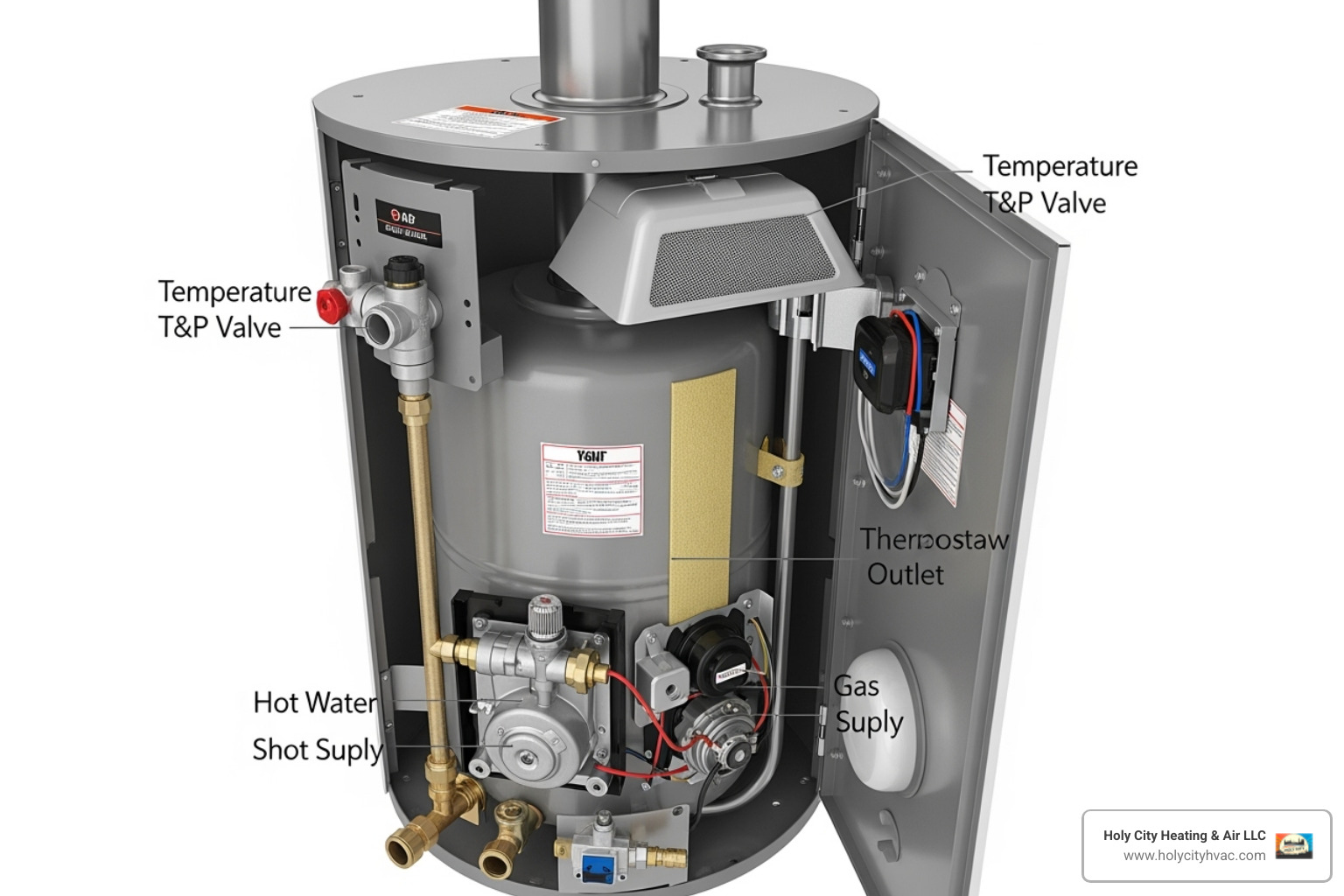
- Gas burner: Located at the bottom, this component ignites to heat the water in the tank.
- Pilot light assembly: In older models, this small, continuous flame ignites the main burner. Newer systems may use electronic ignition.
- Thermocouple: This safety device senses the pilot light's heat. If the flame goes out, the thermocouple cools and shuts off the gas supply. A faulty thermocouple is a common reason pilot lights won't stay lit.
- Gas control valve: This is the system's control center, managing gas flow to the burner and pilot, and housing the temperature controls. Failures typically require professional repair.
- Dip tube: This tube directs incoming cold water to the bottom of the tank for heating, preventing it from mixing with the hot water at the top.
- Anode rod: A metal rod that attracts corrosive elements in the water, sacrificing itself to prevent the tank from rusting. It should be replaced periodically to extend the tank's life.
- Temperature and Pressure (T&P) relief valve: A crucial safety feature that releases excess pressure or heat from the tank. It should be tested annually.
- Drain valve: Located at the bottom of the tank, this valve allows you to drain water and sediment, a key maintenance task.
One important note about natural gas versus propane systems: while the components look similar, they're specifically designed for their fuel type. You can't swap parts between them without professional conversion. The repair processes we'll cover work for both, but always ensure replacement parts match your specific fuel type.
A Step-by-Step Guide to Common Gas Hot Water System Repairs
When your gas water heater acts up, a systematic troubleshooting approach is best. Start with the most common causes. You'll need basic tools like a screwdriver set, an adjustable wrench, a flashlight, soapy water for leak detection, and a bucket with a hose. Always wear safety glasses and gloves.
The golden rule is knowing when to stop and call a pro. If you smell gas, feel uncertain, or the repair involves gas line connections, stop immediately. Some jobs are too risky for DIY. For expert help, contact us for professional water heater repair services.
Problem 1: No Hot Water
No hot water is a frustrating problem, but the solution is often simple. The pilot light is the usual culprit. For most tank-style gas water heaters, an extinguished pilot light is the top reason for no hot water. Check the inspection panel at the bottom of the unit; if you don't see a small, steady blue flame, you've found the issue.
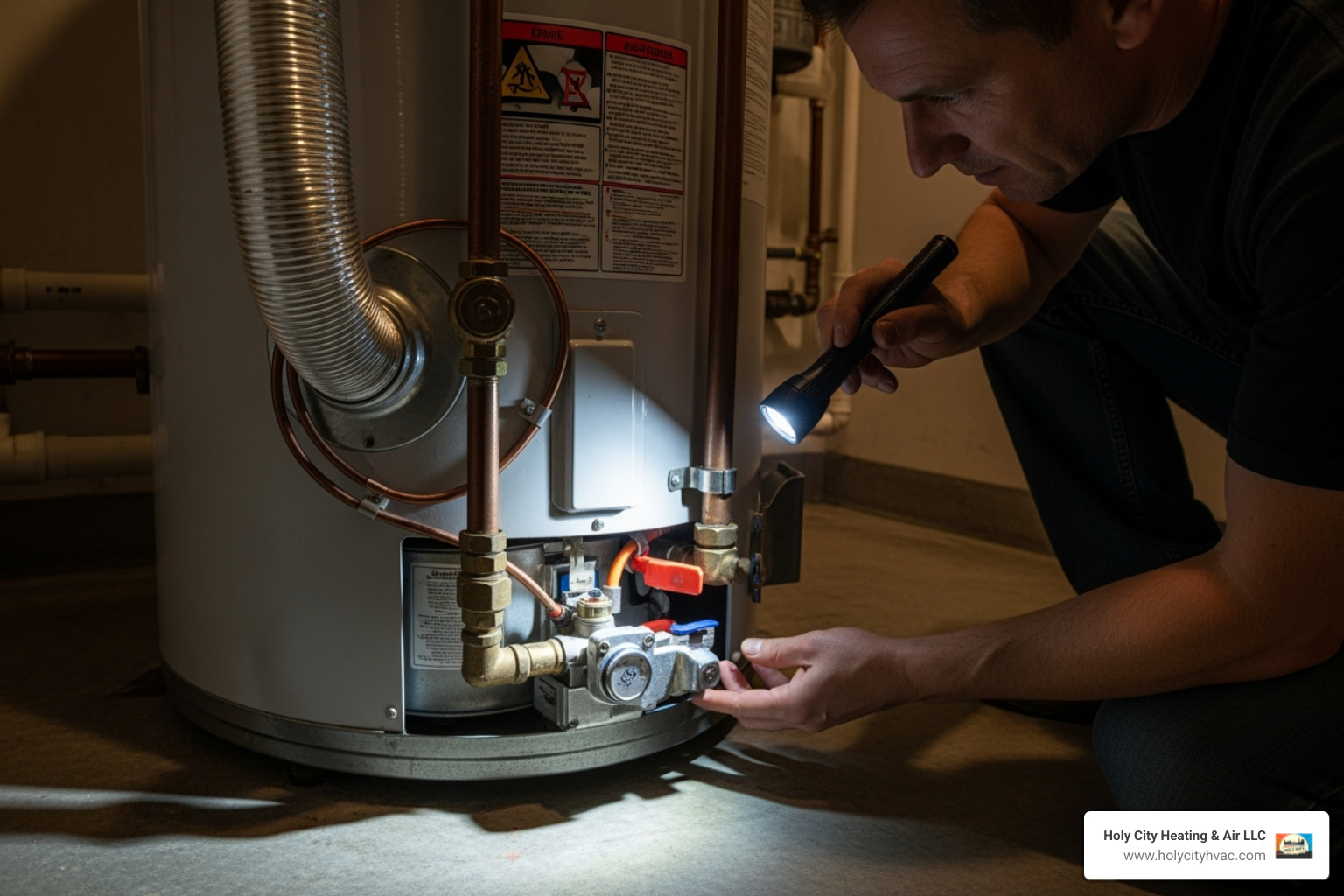
Relighting the pilot is usually straightforward, and most heaters have instructions on a label near the gas control valve. Typically, you'll turn the knob to "Pilot," press and hold the pilot button, and use the igniter until the flame appears. Keep holding the button for 20-60 seconds to let the thermocouple heat up. Release it slowly, and if the flame remains, turn the control knob back to "On." For more details, see this guide on How to relight a pilot light.
Important safety note: If you smell gas when checking the pilot light, don't attempt to relight it. Ventilate the area immediately and call a professional.
If the pilot won't stay lit, you likely have a faulty thermocouple. This copper rod senses the pilot flame to keep the gas valve open. If it's dirty or worn out, it fails. Cleaning it might work, but replacement is often necessary. Since this involves gas connections, we recommend professional service.
A dirty pilot assembly can also cause issues by preventing a strong flame. This is another job best handled by a professional who can safely clean the entire assembly.
Gas control valve failure is less common but more serious. If the pilot is lit but the main burner won't ignite, the valve may be failing and requires professional attention.
Check your gas supply. If other gas appliances aren't working, the problem may be your main supply. Ensure the shut-off valve to the water heater is fully open (handle parallel to the pipe). If the gas was recently restored, there may be air in the lines; running a gas stove burner can help purge it.
Problem 2: Inconsistent or Lukewarm Water
If your water is only lukewarm or turns cold quickly, sediment buildup is the usual suspect. Mineral deposits from hard water can accumulate at the bottom of the tank, creating a barrier that insulates the water from the burner. This forces the heater to work harder and less effectively.
Flushing your tank annually can solve this. Turn off the gas and cold water supply. Connect a hose to the drain valve and run it outside or to a floor drain. Open the drain valve and a hot water faucet in your home. Once the tank is empty, briefly turn the cold water supply on to flush out remaining sediment. Then, close the drain valve, remove the hose, and refill the tank. Once water flows from the open hot water faucet, you can restore the gas supply and relight the pilot.
Thermostat settings are worth checking. The ideal temperature for most homes is around 120°F. Adjust the dial gradually and wait a few hours for the water to heat up.
A broken dip tube can also cause lukewarm water by allowing cold water to mix with hot water at the top of the tank. This requires professional replacement.
Your water heater might be too small for your household's needs. If your family has grown or you've added new appliances, your tank may not be able to keep up. If you constantly run out of hot water, you may need a larger unit. The Department of Energy offers guidance on sizing a new water heater.
Plumbing crossovers, where cold water leaks into the hot water line due to a faulty faucet, are a less common cause that requires a professional plumber to diagnose and fix.
Problem 3: Leaking Water
Finding water around your heater requires quick action to prevent damage.
T&P valve leaks can be normal in small amounts, as the valve releases water during heating cycles. However, a constant drip or gushing water indicates a problem that needs professional attention.

The valve could be faulty, or tank pressure might be too high. T&P valve issues are a safety concern and should be handled by a professional.
Drain valve leaks at the bottom of the tank can often be fixed by gently tightening the valve. If that doesn't work, it may need professional replacement.
Water line connection leaks at the top of the tank can sometimes be fixed by gently tightening the connections. If not, the pipes may be corroded and need replacement.
Tank corrosion is the most serious leak. If water comes from the tank body, it has failed internally. A leaking tank cannot be repaired and the entire unit must be replaced, a common issue for units over 10 years old.
Condensation can sometimes be mistaken for a leak, especially in humid areas. While not a heater problem, it can still damage flooring.
Problem 4: Strange Noises or Smelly Water
A water heater should be quiet. If it makes strange noises or the water smells, something is wrong.
Rumbling or popping sounds almost always indicate sediment buildup. Water trapped under the sediment boils, creating the noise. A thorough tank flush is the solution. Annual flushing can prevent this.
A rotten egg smell in your hot water is usually caused by bacteria reacting with the anode rod. Flushing the tank may offer temporary relief. A more permanent fix is replacing the standard anode rod with a zinc one, which inhibits bacterial growth. For severe cases, a plumber may need to chlorinate the tank. The University of Georgia explains more about causes of odors in household water.
Discolored or rusty water usually indicates internal tank corrosion. Flushing may help temporarily, but it's a strong sign your tank is nearing the end of its life and will likely need replacement soon.
Repair or Replace? Making the Right Call
Deciding whether to repair or replace an aging water heater can be tough. A few key considerations can help you make a smart choice that saves money and prevents future headaches.
Age is a critical factor. Gas water heaters typically last 10 to 15 years. Once a unit is over a decade old, frequent gas hot water system repairs become more common. If your heater is over 12 years old and needs a major repair, replacement is often the more financially sound decision, as other components are likely to fail soon.
Consider repair frequency. If you're calling for service every few months, the costs are adding up. Constant repairs can quickly exceed the cost of a new, reliable unit.
Use this cost-benefit analysis: if a repair costs more than 50% of a new unit's price, replacement is usually the better option, especially for an older heater.
Some problems are deal-breakers. An internal tank leak cannot be fixed and requires immediate replacement. Other signs that it's time to replace include significant rust in your water or persistent pilot light issues that repairs can't solve.
Energy efficiency is another key reason to upgrade. Modern gas water heaters are far more efficient than older models, leading to lower utility bills. Newer units also heat water faster. If you're constantly running out of hot water, consider upgrading to a high-efficiency tank model or exploring Tankless water heater options for an endless supply.
The decision ultimately comes down to your specific situation, budget, and long-term goals. Sometimes a simple repair buys you several more years of reliable service. Other times, replacement is the smart investment that prevents future headaches and saves money over time.

Frequently Asked Questions about Gas Hot Water System Repairs
Here are answers to the most common questions we receive about gas water heaters during our service calls in Charleston.
What is the most common problem with a gas water heater?
By far, pilot light and thermocouple issues are the most frequent problems. A pilot light that won't stay lit is a very common service call. The second most common issue is sediment buildup, especially with Charleston's hard water. Sediment insulates the water from the burner, reducing efficiency and causing rumbling noises. Both problems often result in lukewarm or no hot water.
How do I know if my water heater's thermocouple is bad?
The classic sign of a faulty thermocouple is a pilot light that ignites but goes out as soon as you release the control knob. The thermocouple is a safety sensor that tells the gas valve to stay open when it detects a flame. If it's dirty or has failed, it can't send the signal, and the gas shuts off. While the part is inexpensive, replacement involves safety risks and is best left to a professional.
Can I perform gas hot water system repairs myself?
It depends on the repair. DIY-friendly tasks include relighting a pilot light, adjusting the thermostat, and flushing the tank to remove sediment. These are maintenance jobs that don't involve gas lines.
You should call a professional for any repair involving the gas line, gas control valve, or internal tank leaks. If you smell gas or feel uncertain about any repair, stop immediately and call for help. Your family's safety is paramount, and some jobs are too risky for DIY.
Your Trusted Partner for Charleston Water Heater Needs
We've covered how your gas hot water system works, common troubleshooting steps, and key repairs. Remember: safety always comes first. While some gas hot water system repairs are DIY-friendly, knowing when to call a professional is crucial for your safety and peace of mind. Checking the pilot light, listening for strange noises, and looking for leaks are great first steps that can help you identify the problem.
But when DIY isn't enough, you need a partner you can trust. At Holy City Heating & Air, we've been serving the Charleston community since 2015, with a team that brings over 20 years of industry expertise to every call. Our EPA-certified, licensed professionals have handled every type of gas water heater issue, from faulty thermocouples to complete system replacements.
As a local, family-owned business, we combine the resources of a growing company with a personal touch, serving Charleston and surrounding areas like Hollywood SC and Moncks Corner SC throughout the Lowcountry. We invest in our team's training to ensure you receive the best service.
Whether you need a complex repair or a full replacement, our team is ready to get the job done right. Don't let a faulty water heater disrupt your life.
Contact us for expert water heater services in Charleston, SC and let's get your hot water flowing smoothly again. Because life's too short for cold showers!
Recent posts






